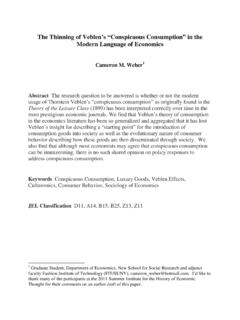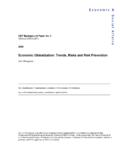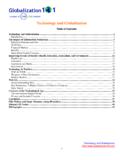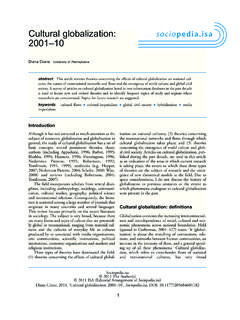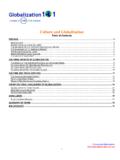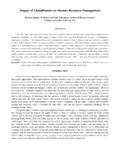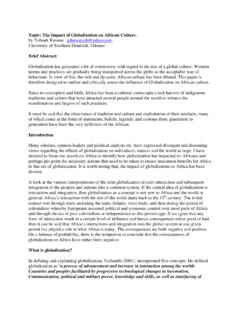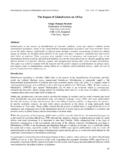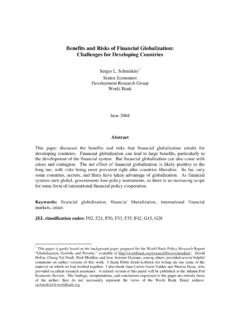Transcription of Adam Smith and Globalization - …
1 Adam Smith and Globalization . Cameron M. Weber Brooklyn, NY. (202) 531-1281. July 2008. As it is the power of exchanging that gives occasion to the division of labour, so the extent of this division must always be the extent of that power, or, in other words, by the extent of the market . Adam Smith , An Inquiry into the Nature and Causes of the Wealth of Nations, New York: Modern Library Edition, [1776] 1994, page 19. The quote above (and its meaning) is one of the most famous by Adam Smith , and therefore one of the most famous in economics. Adam Smith addresses the question of what is economics?
2 , or what is the market? in this quote. It is often said that all of economics is contained in Adam Smith , that everything that has been worked on since 1776 has been reiterations or reformulations of ideas already contained in the Wealth of Nations. To a certain extent this is true. The book contains theory and descriptive evidence around such things as economic behavior, the value of goods in society, the role of the economy in society, how productivity increases lead to economic growth and major societal changes and, the Wealth of Nations contains recommendations for public policy.
3 This essay looks at Smith s ideas in our modern context, the second great wave of Globalization , and finds how relevant Smith is for today. Adam Smith formulated a system which was a comprehensive theory of a free society, of a society of perfect liberty . Prior to the Wealth of Nations Smith wrote about the law and moral and social philosophy, and his final book, the Wealth of Nations, was a summation of his thoughts on human potential and enlightenment . This book was so engaging that we still refer to it today, whether consciously or unconsciously, in our daily lives as people living in societies or as social thinkers to understand the world around us.
4 Smith s economic concept was that productivity, and therefore income and wealth, was increased through the specialization of labor. The more that someone specializes in what they do the better they become at doing it. Production at larger scales is more efficient than production at smaller scales because it allows for the people in the production chain to get better and better at what they do. As production becomes larger in scale, people see their part in the production chain and then find, through introspective reasoning and through working with others, better ways to do their task.
5 These better production methods then find their way into the production cycle and the wealth of the whole economy improves as a result. However it is only when production is subjected to the market that these efficiency gains take place. There is no incentive to go beyond what has always been done . in society unless there are the competitive pressures of the market. A status quo society, a society based on tradition may, or may not, be a happy society (free of envy caused by external stimuli) but it is not a society which sees the dynamic process of increasing standards of living.
6 It is only through the opening-up of a society to the market that tradition feedbacks upon itself and breaks-through to the new. This is what Smith meant by the extent of the market . When Adam Smith was writing society was moving from a society based on feudal lords and serfdom agriculture production. Improved agriculture production meant less labor-intensive agriculture production and the migration of agriculture workers to the cities. This in turn lead to an evolution in tradition societies as cities gained in political power and country-feudal societies lost their grip on political power, slowly but surely over time.
7 The extent of the market was increasing, as the goods which were previously traded and controlled under the power of serfdom relations were diminishing in relation to the rest of the more free, city-based, society. The most obvious example is the nation-states under the Greeks and Romans. The political class conducted politics only. The next, lower, level of society was the unlanded guild class which passed along its craft, say the production of clothing or household furnishings, from generation to generation. The lowest level of society was slave labor, which did all the non-guild manual labor in society.
8 The extent of the market in these societies was limited and did not grow. It was only through imperial conquest that a polis could expect to see their standards of living improve. As these empires proved unsustainable the old traditional forms of society evolved as more and more people became free through the an increase in the extent of the market. Instead of the political class choosing which people could produce what and when a marketization occurred where more and more people began to more and more choose their life s work. This then lead to increasing wealth for all peoples not just the landed political class.
9 As the extent of the market increased, people s ability to choose their livelihood increased as did the productivity in society as labor became more productive through specialization. Instead of the self-appointed, usually hereditary, political leaders determining how society s resources were to be used to reproduce itself and expand, the production and allocation decisions become decentralized and reflected the life decisions of many more people and in turn created wealth for many more people; this is Adam Smith s famous invisible hand , a rising tide which raises all boats.
10 We are currently undergoing a second wave of Globalization . The first wave of Globalization was started during Smith s time which as known as the British Empire. In fact this empire and the international stability that this empire afforded is what allowed Smith to formulate his theories around the comparison of wealth between nations. However, Smith was dissatisfied with the British Empire. The British crown chose which companies could trade internationally and the crown gave concessions to certain business people to have monopolies for trade in specific industries and for specific goods (needless to say the most insidious of these state-granted monopolies was the slave trade).

